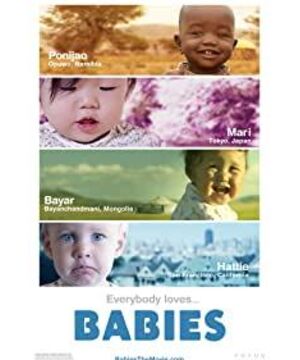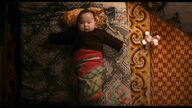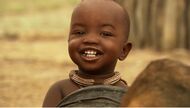My dear baby, how can I tell you that we will no longer be young, and we will no longer have tears in our eyes. But still nostalgia for a better world.
"Sunshine Baby" records the growth of four babies in a dizzy and delightful low-angle. Ponijao, a girl from Namibia, Africa, Bayarjargal, a boy from Bayan Chandman, Mongolia, Mari, a girl living in Tokyo, Japan, and Candy, a girl from San Francisco, USA. There are no lines or narration in the whole film, and a lot of still shots are used to record the slow time of each child from crowing to walking independently.
The director chose to record the baby's life from a low angle of view, which narrowed the distance between the audience and the subject visually and psychologically. And there are rare sports shots, which make the rhythm of the whole film very soothing and pure. In terms of music, the director only chose a simple xylophone to render the atmosphere. The timing of the xylophone insertion is clever. When the baby flutters in the water, cuddles with the kitten, and rolls with teeth and claws on the bed, the light and joyful sound of the xylophone makes people feel a kind of soft power.
The film intersperses the lives of the four babies. African babies crawling on barren land, Mongolian babies with cattle and sheep under the sky and grasslands, Japanese and American babies living in prosperous cities. The director has no intention to compare the influence of the living environment on the baby, but there is still a vertical and horizontal line in the eyes of the audience. The vertical nature is the growth process of each baby, and the horizontal is the comparison between the two life modes of being close to nature and going deep into the prosperous life. I have no intention of commenting on these two modes. The joy of an African baby crawling on a land full of animal dung is the same as the joy of a Japanese baby spreading toys all over the spacious and bright living room. To have to use the conventional eyes of the world to judge the paradise in the eyes of the baby, I think it is a kind of blasphemy to the immaturity. Just like the saying handed down thousands of years ago, how can you know the joy of fish if you are not a fish.
The focus of the whole film is on the four babies. But the director seems to have a special meaning for the paradoxical capture of some shots.
Mongolian baby's older brother dragged their domestic cat on the ground with a rope, and the cat was willing to be teased by the child without struggling. The rooster jumped onto the Mongolian baby's bed. At that time I was very worried that the rooster's claws and beaks would hurt the baby. But the arrogant rooster just stood quietly beside the baby, not moving as the baby looked up and down with curious eyes. The African baby shoved his chubby little hands into the dog's mouth, clinging to the dog's teeth. And that ferocious-looking big dog just used its tongue to push the baby's hand out again and again. When the baby sat in front of the big dog and smirked, the big dog tamely licked the baby's face with his tongue, and the baby laughed even more. And Japanese and American babies also have a lot of close contact with animals.
Babies seem to have a warm power that makes animals and humans involuntarily close. They are undoubtedly the most vulnerable and soft, yet strong and independent.
There is a famous experiment. Put pictures of babies, adults and old people in some wallets, then attach the return address to these wallets and throw them in the streets. As a result, most of the wallets returned contained pictures of babies. Random interviews with some people who say they can't help laughing when they see a baby's smile, somehow willing to do good things for that smile.
Maybe because the baby's smile is not impure, simply laughing for what he thinks is happy, or even laughing for the sake of laughing.
In the film, the African mother puts a small tin can on the baby's head to let the baby walk with it. The African baby smiled happily. The Mongolian baby stared blankly at the ceiling, and suddenly clapped his hands and laughed. The Japanese baby is being held by his father in the hot spring, and giggles at the rising water. Baby American smiles at the cat walking by.
After growing up, there are more and more troubles for no reason, but less and less happiness for no reason. How long has it been since we laughed heartily about something? The intimacy of adults with babies is essentially a disguised nostalgia for the past. It is precisely because this crazy world has given us too many limitations and falsehoods that we yearn for the innocent and reckless baby time of the past, although no one remembers what happened at that time. But watching the baby's every move, we can't help -- or subconsciously, think of ourselves as this baby, become soft and warm.
My dear baby, how can I tell you that we will no longer be young, and we will no longer have tears in our eyes. But still nostalgia for a better world. And this wonderful world is what you have now.
View more about Babies reviews








